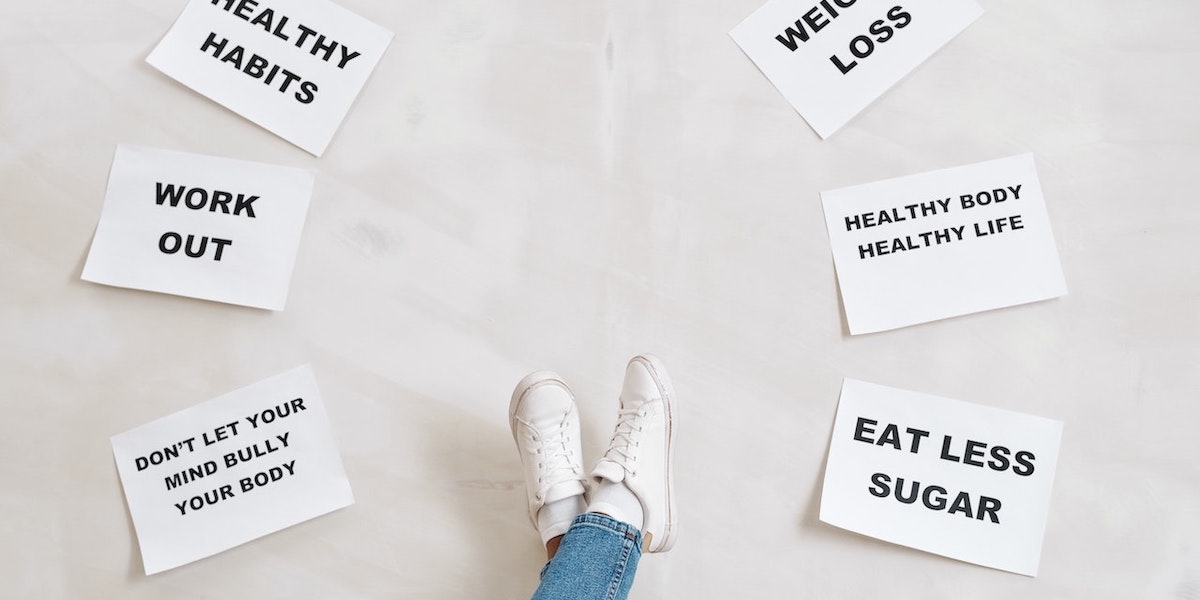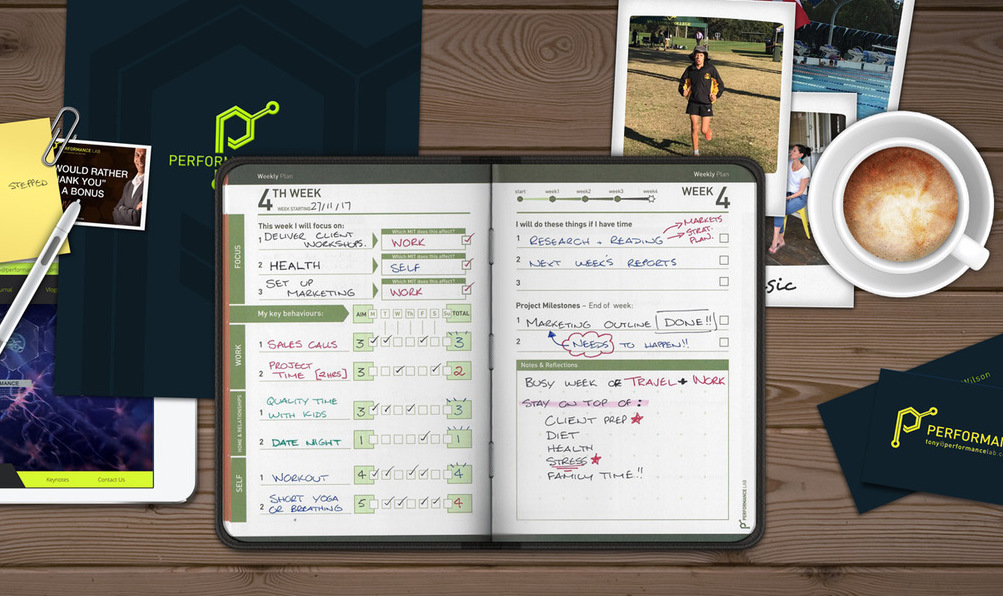Posted by Tony Wilson. Tony is a workplace performance expert. He helps organisations build the culture of high performance. on 5th Apr 2023
5 Habits to Boost Mental, Physical and Emotional Health

Want to know the key habits to track if you want to a make a big impact on your total health? Here are the micro habits that give you maximum impact.
Habits are important. If your habit is to wake up and go to the gym, you’ll have a different life than if your habit is to hit the snooze alarm. If your habit is to get home and have a glass of wine, your life will be different than if your habit is to get home, turn off your phone and cook a healthy meal.
One of my favourite equations looks like this:
Performance = Capability x Behaviours.
It is most important to understand that in this equation, behaviour is a multiplier. So, despite capability or ‘natural talent’ for almost anything, we can still reach great levels of performance with great behaviours that support this.
So, if your most regular behaviours are great, your performance is going to be great, regardless of your capability. What should go in your habit tracker, then? Here are five habits you can start right now that will help to transform your mental, physical and emotional health.
1. Consistent Bedtime Routine
The most important thing we can do in our lives is get good quality sleep. More than exercise and diet, sleep has an enormous impact on our health, mental function, energy levels and emotional control. It is simply one of our best defences against all-cause mortality.
So, what is the key habit to track for sleep? The single most effective thing we can do to get better sleep is to have consistent sleep and wake times and a consistent pre-bed routine.
We can increase the quality of sleep by simply going to bed and waking up at the same time each day. You can sleep the same number of hours, but your percentage of restorative sleep (Deep and REM cycles) will be greater, if you are consistent with your sleep and wake times.
Another aspect of consistency lies in your pre-bed routine. If you want to get to sleep faster and drop into deep sleep quicker, then doing the same things every night in the 30-minute window before you try to fall asleep is critical. So long as this pre-bed routine does not include stimulating activities like viewing screens or intense exercise, sugar, or caffeine – then it almost doesn’t matter what the routine is - what matters is that you have a routine.
Ideas for your habit tracker: Go to bed between 10-10.30 five nights a week. Execute pre-sleep routine six nights a week.
2. Learn something every day
The human desire to lean and grow is underestimated. After all, from the moment we are born, we are learning machines. More than this, it keeps our brains healthy and continuously uses our ‘learning muscles’ so that we get better and better at learning and developing. Unfortunately, the fact that learning is fun and fulfilling gets lost to most people through their ‘formal learning’ years of school. Instead, it becomes tedious and onerous.
So, this habit is about reigniting that thirst for growth and learning. And with new technologies such as podcasts and audio books, this is easier than ever to fit into our lives. Even if you spend five to ten minutes every day reading a few pages of a book, listening to a podcast, or learning a new language, this is time well spent. While fiction is also great (and has its function) this particular habit should truly be about learning, not just pure entertainment.
Let me simplify it to this: Go to sleep at the end of the day, knowing more than when you woke up.
Ideas for your habit tracker: Read 10min, six days a week.
"Go to sleep at the end of the day, knowing more than when you woke up"
3. Move every day
Regardless of who you are, you can probably move more during the day.
We were built to move and when we are stationary or sedentary for long periods, it affects our fitness, our mobility, strength, and our cognition.
If you don’t like to workout regularly, then don’t! Even ten minutes a day factored into your life has a huge benefit if you currently do nothing. Walk for ten minutes, take the long way to the bus, or do 10 squats while you’re waiting for the kettle to boil. Small things consistently over the long term have a huge impact. At this point it’s about building the habit.
But there is a bigger return on your time investment than working out – it’s called NEAT – Non-Exercise Activity – and it just means moving regularly throughout the day.
Research has shown that, in people training for marathons, those who have high amounts of NEAT throughout the day have around 30% better health outcomes than those who do the running alone.
You can count your steps, or whatever gets you up and about, but we all need more NEAT in our days.
Ideas for your habit tracker: Exercise every day
Did you know our Focus Planner has it’s own built-in habit tracker in the weekly plan?
Get yours now
4. Plan your day
If you have heard me speak at all, you would have heard me bang on about this time and time again. Setting our intention at the start of the day is a game changer. For productivity, I don’t believe there is a better five-to-ten-minute investment you can make.
Decide the two to three things that are non-negotiable, then make time in your diary to get them done. That’s the bare minimum. You can also plan out other things that you would like to get done in the day and give them a time slot – including personal time and the activities that help enrich your life outside of work.
When we do this, we become more proactive than reactive, we make sure that we have space in our day for all our intended tasks, and we feel a greater sense of accomplishment when we go home. We also give those to-do items a deadline, which ramps up our sense of urgency, making sure that we procrastinate less, and we naturally shut out distractions.
Will this plan get hijacked? Most likely. We just take a moment to reprioritise and keep working from there.
Ideas for your habit tracker: Plan your day, five days a week
5. Daily reflection
Finally, if planning your day is the best investment you can make in productivity, then this is the best five-minute investment you can make in your mental and emotional wellness. This habit is a game-changer.
You see, our brain plays this trick on us: It is more affected by negatives than positives and remembers those negatives for longer. By the end of the day, any positives have been overridden by our feelings toward the negative things that have happened throughout the day. How do we combat this? With positive reflection.
In its simplest form, this habit is about writing down three things from your day that you thought were good. These can be big, or they can be small – just write them down. When we do this, it has the capacity to change how we process our day and gives us a little squirt of dopamine. In fact, research out of Harvard suggests that doing this just once a week can improve happiness and optimism scores by 150% - that’s worth spending some time on.
Ideas for your habit tracker: Did I do positive reflection today?
What is the cost of these habits?
Nothing is free. There are only trade-offs. The trade-off for these habits is time. But they don’t take nearly as much as you think.
Consistent Bedtime Routines = 0 extra minutes
Move every day = 0-10 extra minutes (incorporate it into what you do now = 0 minutes)
Learn something every day = 0-10 minutes (listen to a podcast on your commute = 0 minutes)
Plan your day = 5 extra minutes
Positive reflection = 5 extra minutes
So, at the worst this will take 30 extra minutes, but most likely around 15 extra minutes. If you tell me that you don’t waste 15 minutes a day scrolling, pinching, procrastinating or multitasking, I would say you are not being honest. So… no more excuses. Get started.


